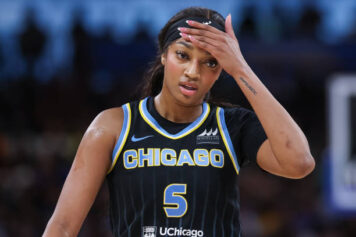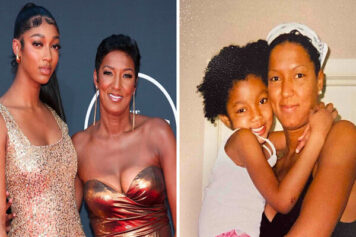The WNBA and its players need to quickly identify who their friends are and who their enemies are, because they are quite confused right now, blindly swinging at any target like a losing boxer looking for a late-round knockout.
The league is so used to fighting and scraping for a bone that it is slow in making the switch in identifying itself as a league people actually care about. It’s almost like they still don’t believe — or believe in — what’s happening. How you handle your fan base has to change as your popularity grows.
WNBA Players Often Lash Out At Fans and Media
It’s to the point where it is clear that not even the popular WNBA players understand why they are popular and what they need to do to maintain that popularity.
Basketball fans aren’t necessarily the same fans that follow players such as Chicago Sky rookie Angel Reese on social media. She has a league-leading 3 million social media followers, but her team still doesn’t draw more than 8,500 to home games (seventh in the WNBA out of 12 teams).
Which means, despite the corporate push and all of the attention the league is getting, there’s still some personal work that the players must do to connect with the public, get them to pay at the ticket gate and maintain the current support they are getting.
Angel Reese Posts About Fans Obsessive Behavior: Calls it “Nasty Work”
Reese and the Chicago Sky posted on social media about fans finding out what hotel they stay in, showing up and “harassing the players.”
She wrote on X:
“finding out our teams hotel to pull with a camera as we get off the bus and put it in my teammates face & HARASS her is NASTY WORK. this really is outta control and needs to STOP.”
What exactly needs to stop? The WNBA is at a moment of unprecedented fame and fandom. This is what the league wanted. More fans and attention so the players can make more money.
Throughout the course of American history, when a celebrity reaches a certain level they will have to deal with all kinds of things regular people don’t. That includes weird fans wanting to touch, speak to them and know their whereabouts. Even taunt them at times.
For the Beatles, to any mega-celebrity since, overbearing fans, even dangerous ones, has been a thing. It’s what happens when you are somebody. Sounds like the WNBA is kind of hesitant to embrace this celebrity Caitlin Clark and few others have brought them recently.
It comes with the kind of fan baggage that these players, who moved in obscurity just a year ago, may not be ready for. They’ve always dealt from a position of proving they were not inferior to the men, demanding pay equity and blaming men for why their league is not promoted and funded better and more revenue-generating, and also for the lack of shoe deals for players such as two-time MVP A’ja Wilson.
Now that the fandom has reached a chaotic pitch, the league is showing that they haven’t schooled the players or prepared them for what truly lies ahead. Angel Reese’s tweet was unnecessary. It’s provocative and off-putting. Sure she can say what she wants, but she has to see the bigger picture.
WNBA Are Rock Stars Now: Embrace the Hate, It’s Also A Form Of Love
The complaints about how the media covers the W, the dialogue fans want to have about the league and the opinions of new fans, is getting a bit annoying to people trying to embrace the WNBA.
Sure, you don’t want people running up on Chennedy Carter asking her Caitlin Clark questions with bad intentions, but Carter and the Sky also have to understand that is what happens when you are the flavor of the month in a world where everybody is instructed to clout chase — players included.
WNBA social activist Natasha Cloud told new male fans to “stfu or invest.” That didn’t look like a player interested in helping the league grow.
Reese’s complaint about some fans harassing coaches or players is par for the course. The WNBA has not reached this place because of incredible play on the court alone. That’s pretty clear. Sure, the women are talented, and they are the best 144 players in women’s basketball in the world.
But now that the WNBA has hit the mainstream sports scene, everybody will have an opinion. If you take too much time responding to the noise, you lose time building bridges.
Maybe that’s why Clark is getting the bag. Even when reporters have crossed the line, she handled it like a pro and didn’t run to her social media to criticize the reporter. Now she has a fan for life.
New fans will want to learn as much as they can about the women who make the league go.
When you’re being promoted as rock stars and getting $28 million Nike deals, or in Reese’s case, deals with Reebok and Mercedes and dressing like an R&B star walking through the tunnels game after game, fans are going to fan.
Fans coming at players in defense of the players they represent and love is also not uncommon.
A year ago, 99 percent of the league could walk through any airport, mall, city street or town and nobody would even say hello, ask for an autograph or be able to identify them or what team they play on, outside of a certain legion of loyal and informed fans.
There’s no time to turn back the clock. Complaining about every little thing a fan or two might do or concerning yourself with some idiot sitting in a shack in Idaho writing on social media is time consuming and just feeds into negativity.
ESPN hoops analyst and First Take panelist Monica McNutt yelling at Stephen A. Smith, a man with the largest sports platform on TV, and trying to shame him for not covering past WNBA action with the same fervor he’s now investing in women’s basketball conversation is also nasty work.
Stop shaming men for talking about your game, then complaining when they don’t show any interest.
There are tons of WNBA players and other women who probably don’t agree with me. But take this advice from a man who has always supported the WNBA and even covered the Charlotte Sting in the league’s early years in 1998-99; put down the defenses.
Throw away the old beliefs that you want men to also let go of. Scratch the pessimism. Embrace the moment. Use your platform to bring the fans into the arenas.
New Generation of WNBA Fan Is Here
The new generation of WNBA fans is here. Many are men. It’s what the league needs to grow. Without fans there is no platform to complain about fans. There’s no check. No future.
Embrace the hate. Embrace the celebrity. Be more open and accepting of fans. Even if they are supporting Cailtin Clark and feeding into the rivalries that the WNBA needs to maintain interest. Don’t say negative things about the fans. That won’t help the next time you roll into someone else’s city. Keep the rivalries intense and on the court, but a sisterhood off of it with one common goal: to promote and expand the game for the future.
The WNBA is a league of good-hearted, competitive, talented women with bright smiles and bigger hearts.
Show it!
Stop targeting men as a downfall to the league, instead of the asset they can surely be financially and any other way. Don’t fear your fans. Use your star power to make them your friends. Even the annoying ones. That’s how you win as a league.

 (@dntsmileattmee)
(@dntsmileattmee) 

